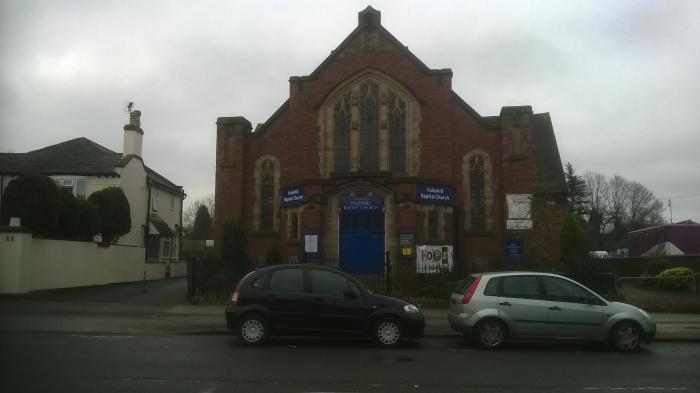|
PhiliPamInCoventry
Holbrooks |
16 of 36
Sun 10th Jan 2016 8:03pm
Hi JVB |
| Buildings - Tramway Cottages, Broad Street | |
|
heathite
Coventry |
17 of 36
Sun 10th Jan 2016 8:23pm
Here's a link to Foleshill St Pauls Baptisms 1879-1904. If you search with the 'find' utility, it will show an entry for Tramway Cottages. |
| Buildings - Tramway Cottages, Broad Street | |
|
heathite
Coventry |
18 of 36
Sun 10th Jan 2016 8:37pm
Hello Philip, excuse me butting in but an elderly local resident told me that Broad Street was called Brick Kiln Lane.
All that you suggest sounds very credible. So if you don't mind the appropriate pun, I reckon you're 'right on track'.
|
| Buildings - Tramway Cottages, Broad Street | |
|
PhiliPamInCoventry
Holbrooks |
19 of 36
Sun 10th Jan 2016 8:46pm
Hi Heathite |
| Buildings - Tramway Cottages, Broad Street | |
|
heathite
Coventry |
20 of 36
Sun 10th Jan 2016 9:02pm
Thank you for that Philip.
One more piece of information from an elderly lady, she said that Station Street was called 'Carpenters Row'. I think she meant Station Street West although I have no idea myself.
I didn't know her but she volunteered the information when we were talking about Brick Kiln Lane. I wonder if anyone else knows?
And on the 1890's maps, Brick Kiln Lane is marked as such. I know Gulson Road was named the same but it wouldn't be a first would it? |
| Buildings - Tramway Cottages, Broad Street | |
|
PhiliPamInCoventry
Holbrooks |
21 of 36
Sun 10th Jan 2016 9:10pm
Hi again, |
| Buildings - Tramway Cottages, Broad Street | |
|
mcsporran
Coventry & Cebu |
22 of 36
Sun 10th Jan 2016 10:18pm
My guess is that the cottages were used by workers constructing the orginal tramway in the early 1880s or the electrification of the system in the early 1890s. Both would have involved a storage area somewhere nearby for the trackway, traction poles and so on before the establishment of the depot on the Foleshill Road. |
| Buildings - Tramway Cottages, Broad Street | |
|
Kaga simpson
Peacehaven, East Sussex |
23 of 36
Mon 11th Jan 2016 10:40am
My guess is that Courtaulds had some sort of its own tram turn around, could this not have been something to do with it or workers of the tram system at Courtaulds? |
| Buildings - Tramway Cottages, Broad Street | |
|
Kaga simpson
Peacehaven, East Sussex |
24 of 36
Mon 11th Jan 2016 10:56am
There were at least 4 brickworks between the Slough and the Oxford Canal to my knowledge, so the area was swarming in them, why they needed so many I have no idea, unless the 'pits' used a lot, coal and clay? Is this a new topic? |
| Buildings - Tramway Cottages, Broad Street | |
|
PhiliPamInCoventry
Holbrooks |
25 of 36
Mon 11th Jan 2016 11:57am
On 11th Jan 2016 10:40am, Kaga simpson said:
My guess is that Courtaulds had some sort of its own tram turn around, could this not have been something to do with it or workers of the tram system at Courtaulds?
Hi Kaga,
The tram system that went into the Courtaulds site, was part of the municipal Foleshill tramway & did so off the Foleshill Rd, adjacent to the canal bridge & building. That was 1900 era, whereas the tramway cottages were at least a hundred years prior. It was the eighteenth & nineteenth century expansion of the towns & cities that required so much building materials, hence such a demand for building bricks. The marl clays around Coventry were perfect for making bricks, until it ran out. Hope that helps. |
| Buildings - Tramway Cottages, Broad Street | |
|
NormK
bulkington |
26 of 36
Mon 11th Jan 2016 2:25pm
The church in Broad Street.

Milly rules
|
| Buildings - Tramway Cottages, Broad Street | |
|
Kaga simpson
Peacehaven, East Sussex |
27 of 36
Mon 11th Jan 2016 5:35pm
Mods, when I go to the search button above the post, I fail to find the topic as I am not aware of its wording, example I tried to find the tram picture of the tram outside Courtaulds? I'm aware of the topic 'you know when your getting old', but please bear with me. Thanks Kaga.
NormK, I think the house I was after is the right hand side of the Church and in front of Tramway Cottages. Can't remember those buildings there now under the tree, doubt they were there in the 50's?
Thank you Philip for your reply.
|
| Buildings - Tramway Cottages, Broad Street | |
|
dutchman
Spon End |
28 of 36
Mon 11th Jan 2016 6:23pm
The Turk's Head was renamed The Tramway at one point so there's every reason to think the cottages may have been renamed too around the same time.
|
| Buildings - Tramway Cottages, Broad Street | |
|
Prof
Gloucester |
29 of 36
Tue 12th Jan 2016 5:21pm
I think you will find that Gulson Road, Binley Road, was previously Brick Kiln Lane, so I think it unlikely that Broad Street had the same name. |
| Buildings - Tramway Cottages, Broad Street | |
|
Midland Red
|
30 of 36
Tue 12th Jan 2016 5:34pm
You are correct, Prof, and you are also wrong |
| Buildings - Tramway Cottages, Broad Street | |
Website & counter by Rob Orland © 2024
Load time: 588ms